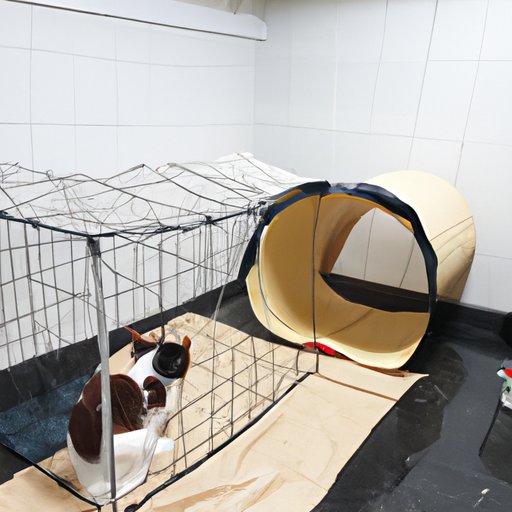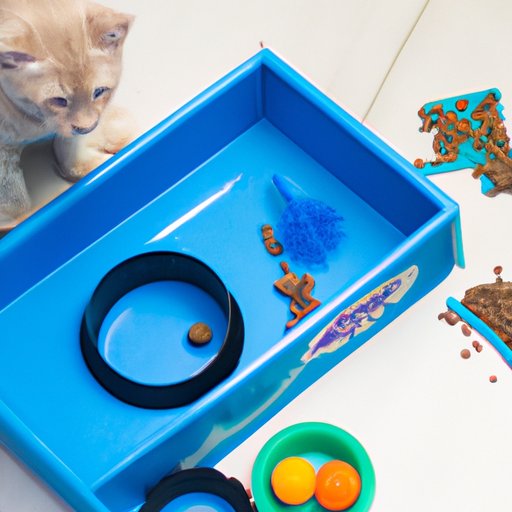Introduction
Bringing a new kitten into your home is an exciting experience, but with this excitement comes responsibility. Caring for a kitten requires lots of attention and dedication. Understanding how to properly care for a kitten will ensure a long and happy life for your furry friend.
A kitten is defined as a young cat that is between one and six months old. During this time frame, kittens are growing rapidly and require more care than adult cats. It is important to provide a safe, comfortable space for your kitten, establish a regular feeding schedule, provide toys and activities to keep them occupied, and take them for regular vet visits.

Prepare a Safe and Comfortable Space for the Kitten
The first step in caring for a kitten is to prepare a safe and comfortable space for them. Choose a quiet, private room that is away from loud noises and excessive activity. This will be the kitten’s safe haven where they can rest, play, and explore without feeling overwhelmed.
Provide necessary supplies like bedding, scratching posts, and litter boxes. Make sure the bedding is soft and free of any sharp objects. Scratching posts are essential for kittens because it allows them to sharpen their claws and express their natural behavior. Place the scratching post near their bed or in an area they frequent.
Establish rules in the home and make sure everyone follows them. Kittens need to learn boundaries and understand what behaviors are acceptable. Some rules may include no rough play, no chasing the kitten, and no unsupervised access to the outdoors.

Establish a Regular Feeding Schedule
Kittens need to eat multiple times throughout the day. Determine what type of food to feed them based on their age and activity level. Kittens should primarily eat wet food as it is easier for them to digest. Avoid giving them too many treats as it can lead to obesity and other health problems.
Determine how often to feed them according to their age. Kittens between 4-6 weeks old should have access to food all day. Kittens between 6-12 weeks old should have three meals per day. Kittens over 12 weeks old should have two meals per day.
Monitor your kitten’s eating habits to make sure they are getting enough nutrition. If they seem to be eating less than usual or refusing to eat, contact your vet for advice.
Provide Toys and Activities to Keep the Kitten Entertained
Kittens need plenty of stimulation to stay healthy and active. Provide them with different types of toys like balls, feather teasers, and stuffed animals. This will help keep them entertained and prevent boredom.
Allow your kitten to play with other pets, if you have them. Playing with other animals can help kittens with socialization and provide mental stimulation. However, always supervise these interactions to ensure the safety of both pets.
Human interaction is also important for kittens. Spend time playing with them each day and make sure to give them plenty of love and affection. This will help them bond with you and build trust.

Schedule Regular Vet Visits to Monitor Health
Kittens need to visit the vet regularly to ensure they are healthy and up to date on their vaccinations. Vaccinations are essential for kittens as they protect them from diseases and viruses. The vet will also provide preventative care such as deworming and flea prevention.
If you plan to keep your kitten indoors, it is important to have them spayed or neutered. This will reduce the risk of certain health problems and prevent unwanted litters of kittens.
Create a Litter Box Routine
Kittens need to learn how to use the litter box, so it is important to create a routine. Choose a location for the litter box that is easily accessible and away from noise and traffic. Make sure to clean the litter box frequently to prevent odors and bacteria buildup.
Train your kitten to use the litter box by placing them in it after they wake up, after they eat, and after they play. Praise them when they use the litter box correctly.

Introduce the Kitten to Other Family Members and Pets
Socialization is an important part of caring for a kitten. Introduce them to other family members and pets slowly and in a controlled environment. Allow them to explore and get used to their new surroundings.
Safety is key when introducing a kitten to other animals. Always supervise these interactions and look out for signs of aggression or fear. If either animal becomes agitated, separate them immediately.
Monitor the kitten’s behavior around other animals. If they seem to be getting along well, slowly increase the amount of time they spend together.
Provide Regular Grooming and Brushing
Grooming and brushing are important for maintaining a kitten’s health and appearance. Regular grooming helps prevent mats and tangles, while brushing helps distribute natural oils throughout the fur. Invest in quality grooming tools and use them as directed.
Brush your kitten daily and groom them at least once a week. Pay special attention to areas like behind the ears, under the chin, and around the eyes. If your kitten doesn’t like being brushed, start slow and use treats to reward them for good behavior.
Conclusion
Caring for a kitten requires patience and dedication. Providing a safe and comfortable space, establishing regular feeding habits, providing toys and activities to keep them entertained, scheduling vet visits to monitor health, creating a litter box routine, introducing the kitten to family members and other pets, and providing regular grooming and brushing are all essential steps in caring for a kitten.
(Note: Is this article not meeting your expectations? Do you have knowledge or insights to share? Unlock new opportunities and expand your reach by joining our authors team. Click Registration to join us and share your expertise with our readers.)
